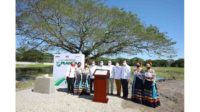A breakthrough plastic recycling plant is set to open in Durham, United Kingdom, with a significant investment from Nestlé UK and Ireland.
Impact Recycling will open the new facility to process hard-to-recycle flexible plastics, typically used in food packaging, into pellets which can be used to make new flexible products such as postbags and refuse bags.
Nestlé has agreed to provide Impact Recycling with a £7 million loan to get its pioneering process off the ground. With additional contributions from Innovate UK, the site is set to be operational in late summer 2024.
“I am thrilled to be joining forces with Impact Recycling and helping fund this new plant in Durham,” said Sokhna Gueye, Head of Packaging at Nestlé UK & Ireland. “At Nestlé, we are dedicated to ensuring our packaging can have multiple lives and doesn't end up as waste in landfill. Supporting innovative technologies like this is just one of the many steps we are taking towards achieving this goal."
The innovative process, known as Baffled Oscillation Separation System or BOSS, sorts the waste plastics by spinning them in water, meaning that different materials either sink or float, depending on their density. This makes it easier to take the correct materials to be recycled.
The site, when it opens, will have the capacity to take 25,000 tonnes of this plastic, and produce the pellets which can be used to replace virgin plastic films in construction and agriculture, or to make bin bags. This means the facility has the potential to recycle more than the amount of flexible plastic packaging Nestlé UK and Ireland places on the market.
Packaging such as KitKat wrappers, Purina pet food pouches, Rowntree confectionery sharing bags and Nestlé Cereal bags, will be collected from major supermarket collection points so they can be recycled.
“We are delighted to partner with Nestle on this initiative to develop a 25,000-tonne commercial recycling plant for post-consumer flexible plastic,” added David Walsh, CEO of Impact Recycling. “Without the funding from Nestlé this development would not have been possible. Through this funding, Nestlé demonstrates its unwavering commitment to innovation and the pursuit of sustainable solutions for plastic packaging.”


